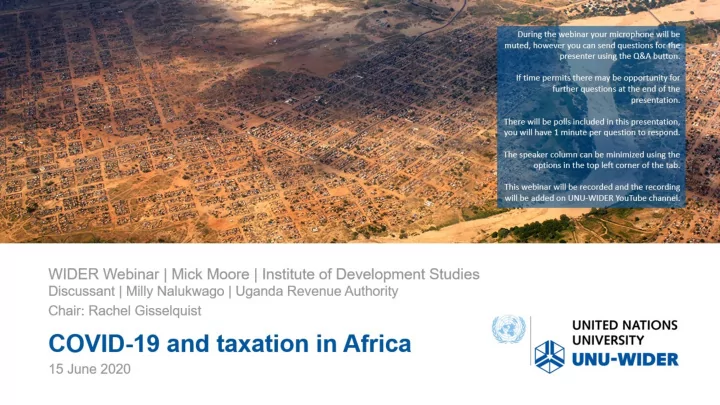

International Centre for Tax and Development www.ictd.ac
1. Tax after the Pandemic: Can Africa Raise the Revenue It Needs? Mick Moore 15 th June 2020 International Centre for Tax and Development International Centre for Tax and Development www.ictd.ac www.ictd.ac
2. And now? How important is it to start taxing the informal sector? A. Very important B. Moderately important C. Not very important D. I don’t know what that would mean in practice International Centre for Tax and Development www.ictd.ac
3. Total government revenue as a % of GDP , country averages, 2017 South Asia 16% Sub-Saharan Africa 19% Latin America and Caribbean 24% East Asia and Pacific 27% Middle East and North Africa 30% North America 37% Europe and Central Asia 38% International Centre for Tax and Development www.ictd.ac
4. % of visits to firms by (internal) tax inspectors that were reported to be associated with a request for a bribe (From World Bank Enterprise Surveys 2002-12) 35 30 25 20 15 10 5 0 Latin America and Sub-Saharan Balkans, Central South Asia North Africa, Caribbean Africa and Eastern Middle East, Europe, Baltics Central Asia International Centre for Tax and Development www.ictd.ac
5. For more information: Sub-Saharan Africa scores fairly well with respect to: • Tax effort • Direct taxes as % of all taxes • Time taken to comply with tax process • ‘Post-filing index’ = time taken by tax administration to correct mistakes International Centre for Tax and Development www.ictd.ac
6. Because of tax administration reforms implemented over the past 20 to 30 years… International Centre for Tax and Development www.ictd.ac
7. The taxpayer is less likely to need to physically meet and make tax payments to the tax man, AND … is less likely to need to meet one tax man for Income Tax, a second for Sales Tax/VAT, and a third for Excise Tax… AND… International Centre for Tax and Development www.ictd.ac
8. The tax man is more likely to be a woman, AND …is more likely to have a professional qualification, and have a specialist role in IT, accounting, taxpayer services, taxpayer education, human resources, internal vigilance, research, law… International Centre for Tax and Development www.ictd.ac
9. BUT, despite the near-universal adoption of VAT, which is now the largest single source of revenue in sub-Saharan Africa, the ratio of government revenue to GDP is somewhere between stationary and increasing very slightly. WHY? International Centre for Tax and Development www.ictd.ac
Political explanation? Uganda In 2013/14, only 1 of 71 identified rich government officials paid PIT. Only 17 of the 56 companies with which they were associated paid CIT International Centre for Tax and Development www.ictd.ac
11. Political explanation? Rwanda In 2018, only 8 of 42 If all their employment, people identified as investment and other probable High Net income were subject to Worth Individuals filed withholding tax, that a PIT return (ICTD, would be OK. Is it 2020) covered? International Centre for Tax and Development www.ictd.ac
12. Some other political decisions to not tax Undertaxing wealth and property Undertaxing mining Undertaxing tobacco and alcohol Granting excessive exemptions to investors Creating too many VAT exemptions (Not to mention all the challenges of taxing transnational and digital economic transactions) See ICTD Working Paper 70, 2017. International Centre for Tax and Development www.ictd.ac
13. Organisational explanations? Why is IT so under-used, for important functions? How do we explain the obsession with registering large numbers of new – and therefore small – taxpayers? International Centre for Tax and Development www.ictd.ac
14. The current situation Revenues are falling – less economic activity, deferrals, practical collection challenges More digitised revenue administrations can cope better (?) Sub-national governments worst hit (?) Governments will need to increase revenues (within a year, or two?) International Centre for Tax and Development www.ictd.ac
15. Threats Governments will be unable to restore or raise revenues They will just tax what they can, and cause a lot of problems Tax will become very contentious Informal taxes on poor people will increase International Centre for Tax and Development www.ictd.ac
16. Opportunities …. To raise revenue in ways that are demonstrably fair, command public support, and contribute to solving some of the broader problems facing humanity. Three principles: The poorest 50% (or even 80%) of households should not be expected to pay more. They are suffering enough. Much of the additional tax burden should fall on wealth – or on those who have avoided economic pain during the crisis – but not on business generally. Revenue plans with vision, designed not only to raise revenue but also to address other major societal problems, including environment and climate change. International Centre for Tax and Development www.ictd.ac
Thank you Web: www.ictd.ac | Email: info@ictd.ac | Twitter: @ICTDtax International Centre for Tax and Development www.ictd.ac
Recommend
More recommend